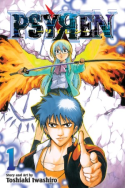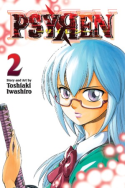By Toshiaki Iwashiro | Published by VIZ Media
 Ageha Yoshina is a first-year highschool student who channels his passion for fighting into helping people (for a fee). When classmate Sakurako Amamiya goes missing, he can’t just ignore it, particularly since she seems to know something about Psyren, a mysterious organization that recently issued Ageha a phone card when he answered a ringing public phone. The quest to find Sakurako leads Ageha to Psyren itself, which is not so much an organization as a place—a dangerous dimension where a chosen few (known as Psyren Drifters) brave the harsh landscape and murderous denizens to reach a particular gate, at which point they return home to be called again in the future, using the interval to learn more about Psyren and hone the psionic skills that Psyren’s atmosphere has infected them with.
Ageha Yoshina is a first-year highschool student who channels his passion for fighting into helping people (for a fee). When classmate Sakurako Amamiya goes missing, he can’t just ignore it, particularly since she seems to know something about Psyren, a mysterious organization that recently issued Ageha a phone card when he answered a ringing public phone. The quest to find Sakurako leads Ageha to Psyren itself, which is not so much an organization as a place—a dangerous dimension where a chosen few (known as Psyren Drifters) brave the harsh landscape and murderous denizens to reach a particular gate, at which point they return home to be called again in the future, using the interval to learn more about Psyren and hone the psionic skills that Psyren’s atmosphere has infected them with.
I wasn’t sure what to think of Psyren at first. It starts slowly, and neither Ageha nor Sakurako are particularly distinct characters (Ageha because he’s so like every other shounen hero and Sakurako because Iwashiro-sensei is admittedly not aiming for any kind of consistency in her characterization). Once Hiryu—a formerly wimpy elementary school classmate who is now simultaneously hulking and thoughtful—arrives, however, things begin to improve. He provides a foil against which Ageha can be compared, which makes their psionic training sessions (in which Hiryu excels with concentrated effort and Ageha fails time and time again until he unleashes a powerful, uncontrolled burst) pretty fun.
 It also helps that the concept of Psyren has elements that remind me of other series: the giant insectoid creatures and dire depiction of Japan’s future remind me of 7SEEDS, the cyborgish enemies remind me of BLAME!, and the contract by which unwitting participants are forced to risk their lives for some vaguely explained purpose reminds me of Bokurano: Ours. It remains to be seen whether Psyren will truly turn out to be as great as these other series, but it does have a dark edge—hinting that one’s performance in the game can somehow impact Earth’s future—that I appreciate.
It also helps that the concept of Psyren has elements that remind me of other series: the giant insectoid creatures and dire depiction of Japan’s future remind me of 7SEEDS, the cyborgish enemies remind me of BLAME!, and the contract by which unwitting participants are forced to risk their lives for some vaguely explained purpose reminds me of Bokurano: Ours. It remains to be seen whether Psyren will truly turn out to be as great as these other series, but it does have a dark edge—hinting that one’s performance in the game can somehow impact Earth’s future—that I appreciate.
To be sure, Psyren is not perfect. As mentioned, the main problem is Sakurako. She, quite literally, seems to change personality from panel to panel. At first, I thought that maybe this was happening because she’d used her psionic abilities so much that it had affected her mind, but after Iwashiro’s confession—“I was very careful when portraying [heroine of previous series]’s personality, but I’ve tempered that tendency, allowing for more of a kaleidoscopic view of Sakurako”—that doesn’t seem to be the case. Too, I feel like we’re supposed to find Matsuri-sensei, the concert pianist/biker chick who has beaten the Psyren game, cool and awesome, but she just makes me yawn.
Ultimately, Psyren is better than I thought it would be. It’s also, at sixteen volumes, not a sprawling epic that would require a huge commitment. At the moment, at least, I plan to continue for the long haul.
Psyren is published in English by VIZ Media. The third volume came out this week. The series is complete in Japan with sixteen volumes.
Review copies provided by the publisher.




Speak Your Mind